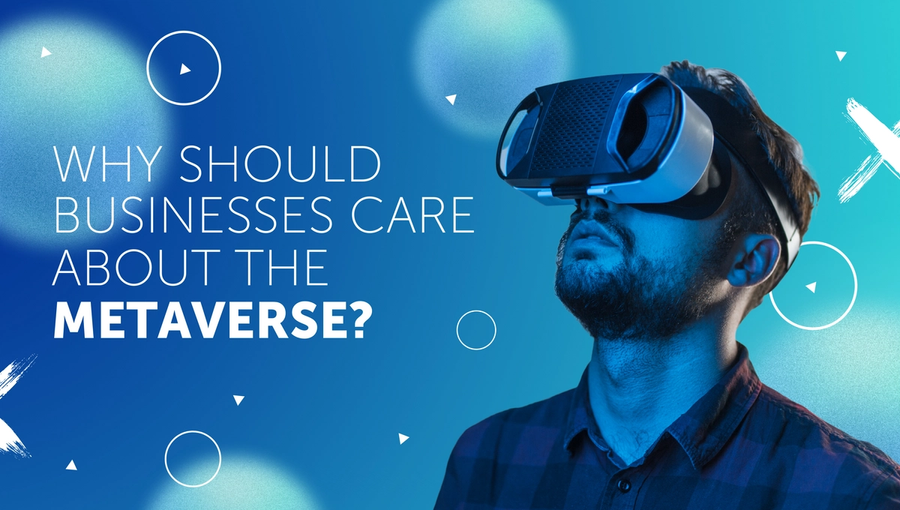News, Views & Opinions
Why should businesses care about the Metaverse?
You've probably already heard rumblings about the metaverse. One question you might be asking yourself is: why should I care about it?
Some commentators are seeing the metaverse as the next digital evolution, just like the internet before it. If businesses recognise this early and can tap into the metaverse in the right way, they could see amazing results if (as some companies claim) the metaverse does become the norm.
Then again, not everyone is keen on the metaverse – some critics say the concept is wildly overhyped and will never get off the ground, while others believe it could promote a toxic culture online that could be damaging to our mental or even physical health. That’s not exactly a great space for brands to be marketing in.
Some businesses have already made big pledges about how they want to take expand their reach through the metaverse, and no matter what comes next it needs to be on your radar.
What is the metaverse?
If you aren’t already familiar, the metaverse is an immersive virtual reality (VR) world that exists outside the physical realm. Most of the time, it’s a world we access via a blend of VR and augmented reality technologies.
In the metaverse, we would be interacting with other digital avatars and objects to affect certain changes in the real world. It’s kind of like the simulated computer world from The Matrix (without the murderous robots trying to kill everyone, of course).
Facebook changing its name to Meta has unleashed a wave of hype around the metaverse concept – but the truth is, there are already experiences out there that technically qualify as a metaverse. Look at massively online multiplayer games such as Fortnite and Roblox, which see entire groups of people coming together in a shared world that doesn’t exist.

Meanwhile, the AR and VR market is growing fast – the global VR market is expected to reach a whopping $109.61bn by 2026, for example. The better these technologies get at rendering a digital world, the more uses businesses have for them. Imagine, being able to walk through a virtual recreation of your office on the surface of Mars – all while looking through VR goggles in your living room.
With all this hype surrounding the metaverse and evolving VR technologies, what does this mean for marketing?
The metaverse could change the way many businesses market themselves
Roblox is a platform with nearly 50 million daily users – if we all end up exploring persistent digital realms in the future, that makes us a captive audience for brands.
Gucci’s already been getting in the game, targeting Roblox players with a digital-only range of handbags, sunglasses or hats that their avatars can wear. Instead of just putting them on a menu, items were hidden away in a virtual online space for Roblox players to explore called the Gucci Garden.
To give a slightly more violent example, Wendy’s livestreamed a player destroying loads of freezers in a virtual restaurant in Fortnite, supporting its ‘always fresh’ message while amassing more than a quarter of a million views.
Then there are non-fungible tokens(NFTs), which bestow unique ownership of a digital asset on users, making them the only person in the world who can say they own that asset. There's a whole world of things to say about NFTs, and we’ve explored both the good and the bad in our new trends guide for 2022.
Is the metaverse a good thing?
Not everyone is painting such a rosy picture of the metaverse, and we’ve already seen questionable uses of VR. In Turkey, a rancher has strapped VR headsets onto cattle as part of an experiment to see if the cows produced more milk – it's one thing subjecting consenting human adults to the virtual realm, but this definitely seems to be taking things too far.
There have already been reports of severe online harassment – a beta tester reported that she had been groped on Meta’s VR platform in late 2021, raising the issue that an even more immersive digital environment could make online misogyny even worse for women.
There’s also serious questions about the effect that the metaverse might have on us as people, and whether this is something people actually want. The digital realm might open up all kinds of new possibilities – but do people want to spend their entire lives foregoing real, authentic experiences to log in to a completely digital space? That’s yet to be seen.
What we do know is that consumers are growing more nervous about how companies use their data, and many of them might not like the idea of signing into virtual realms built and managed by ‘big tech’ companies.
What should businesses be doing now?
You might still be thinking: why does any of this matter to me?
We’re not saying that you should be looking to get into the metaverse right this second – but it’s important to note what all this hype is telling us –the growth of technology is changing consumers expectations, but it’s also leading us to pose more ethical questions too.
There's a lot of uncertainty out there. But what is certain is that brands need to be getting the basics right before they get sucked into the metaverse hype. Ask yourself the following questions.
- Could you be creating more interesting social media posts to engage people and build a devoted following online?
- Could you be writing more relatable blogs that will make people see you as a thought leader in your field?
- Do you currently lack a digital PR strategy that positions your brands alongside trending stories?
While some brands are jumping on the metaverse bandwagon, it’s not yet clear if all of them should be. What is clear is that consumers are drawn to more immersive, engaging experiences online – that’s why you need to approach your marketing with innovation and adaptability in mind.
Want to read about other explosive digital marketing trends of 2022? We’ve got it all covered in Nutcracker’s brand new guide: Marketing Trends 2022: A guide for business leaders. Click here to download this brand new guide, or book a free consultation with Nutcracker today and find out how you can switch up your marketing in 2022.
Share this:





